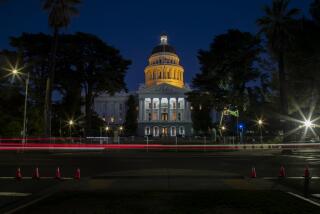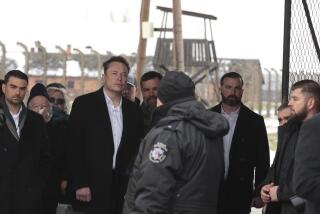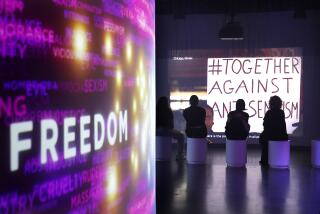Japanese Firm Offers Class on Holocaust : WWII: Publisher of article denying atrocities holds employee seminar in attack on anti-Semitism.
- Share via
TOKYO — In a landmark attempt to avert anti-Semitism in Japan, an influential publishing firm on Friday concluded a three-day employee seminar on the Holocaust after publishing an article earlier this year that denied that the Nazis operated gas chambers.
The company, Bungei Shunju Ltd., invited the Simon Wiesenthal Center of Los Angeles to conduct the seminar after closing down the offending publication, Marco Polo, in February in contrition for the article.
Titled “The Greatest Taboo of Postwar History: There Were No Nazi Gas Chambers,” the Marco Polo article provoked a storm of protest and an advertising boycott from Volkswagen, Cartier, Mitsubishi Motors and others.
Rabbi Abraham Cooper praised Bungei for its “unprecedented step” in attempting to educate people here about Jews.
But he acknowledged that it was just a beginning in a nation where anti-Semitic writings regularly appear, even though the Japanese have little extensive contact with Jews and there is a resident population of less than 2,000 Jews here.
“Realistically, it’s the first step,” Cooper said. “There are all kinds of stereotypes on both sides and a cultural gap as deep as the Grand Canyon.”
One cultural gap was immediately apparent in surprisingly blunt questions from the 120 Bungei employees who signed up for the seminar: the Japanese discomfort with assertions of black and white, of assigning all blame on just one side.
In one question-and-answer session, for instance, Hiroaki Shimazu, an editor, condemned the Holocaust as unforgivable. But he questioned whether Jews themselves had any faults that might have contributed to their long history of persecution.
Citing a Japanese proverb that “even thieves have reasons to be justified,” Shimazu said it reflected the feeling that no one is ever completely right and that a true friendship between Jews and Japanese could not begin unless they honestly revealed their flaws to each other.
He said, for instance, that some Japanese viewed Jews as an elite group who placed themselves above others as “the chosen people.”
“Are you willing to share with us? This is what we are curious about,” he said.
“There are no perfect individuals,” Cooper said, but he cited no particular flaws. And Rabbi Daniel Landes, the Wiesenthal Center’s director of national education projects, compared the question to assertions that a raped woman “asked for it.”
Others asked about justice for the Palestinians and the U.S. stance on the atomic bomb attacks against Hiroshima and Nagasaki--questions Cooper said he found surprisingly lively after being warned to expect only “polite silence” from the crowd.
The questions underscored the Japanese tendency to approach disputes as less a matter of moral rights and wrongs than of the balancing of conflicting interests.
The reluctance to assign or accept full blame is apparent in the current debate over whether the nation should apologize for its World War II deeds.
*
To some Japanese, the U.S. refusal to acknowledge any mistakes--asserting that both atomic bomb attacks were totally justified, for instance, or failing to acknowledge the history of Western colonialism in Asia as one mitigating factor for Japan’s acts--has stiffened resistance against a war apology.
Despite the differences of opinion, Cooper praised Bungei’s gesture and said he hoped that it will help break the cycle in Japan of anti-Semitism, apologies and more anti-Semitism.
Jewish groups here have repeatedly protested incidents such as a Liberal Democratic Party official’s use of Adolf Hitler’s writings last year for a campaign manual and advertisements for books alleging a Jewish financial conspiracy carried by the Nihon Keizai Shimbun, a respected financial daily.
Aum Supreme Truth, the religious group under suspicion for carrying out a poison gas attack on Tokyo subways in March, venerated Hitler and used his writings in cult schools.
But at the same time, Anne Frank’s “Diary of a Young Girl” has sold nearly 5 million copies here--published in Japanese by Bungei--and an exhibit on the Holocaust last year drew 80,000 people in the first 10 days.
Over three days, Cooper, Landes and Claremont College professor Alfred Balitzer presented the Academy Award-winning documentary “Genocide,” brought a Zyklon B canister used in the gas chambers, and lectured on the Holocaust, the history of anti-Semitism, Jewish culture and the quest for a homeland.
Next month, Bungei plans to send 10 top executives to Los Angeles to visit the Wiesenthal Center.
More to Read
Sign up for Essential California
The most important California stories and recommendations in your inbox every morning.
You may occasionally receive promotional content from the Los Angeles Times.













